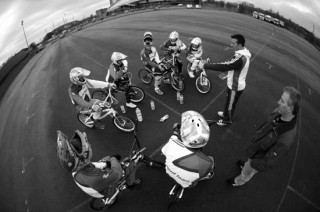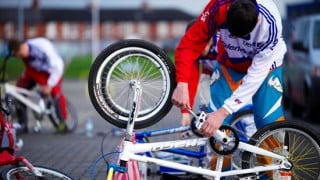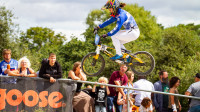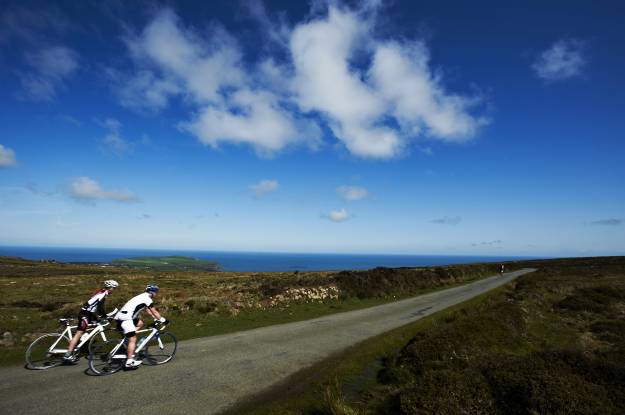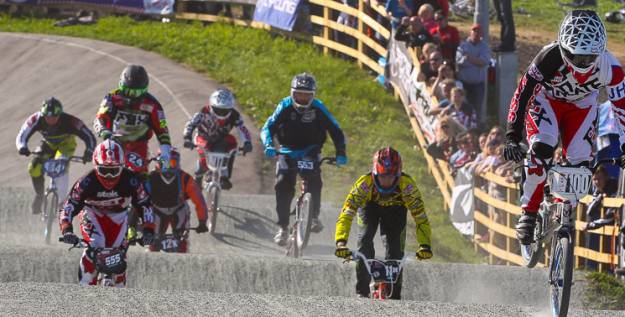![]() BC on Facebook
BC on Facebook ![]() BC on Twitter
BC on Twitter ![]()
British Cycling BMX Talent Team Launch
Posted December 21 2009
Words And Photography: Luke Webber
BMX: Road To 2012
British Cycling's Performance Programmes Explained
Team GB BMX Roster | Join Team GB
Last weekend the newly selected British Cycling BMX Talent Team visited Manchester to meet their counterparts and receive coaching from British Cycling staff on and off the bike. Luke Webber joined the riders and Jeremy Hayes to sample the weekends camp and discover the direction on British Cycling BMX development at its entry-level.
"BMX is going back to basics." That was the resounding message delivered by British Cycling's Talent Team coach Jeremy Hayes following weeks of assessment, before selecting riders he believes to be Britain's best BMX prospects for the 2016 Olympics.
And although setting cones out in the Velodrome car park for an afternoon skill session may seem far detached from the biggest stage in small wheeled racing, there was a bigger shock in store. The latest intake of riders would immediately be required to remove their SPD pedals in exchange for flats and a series of no-frills drills designed to test the foundation of the skills required to make an Olympic-standard athlete.
Hayes' conviction of a focussed plan toward this goal - a plan which holds the perfection of basic, repeatable skills in the same regard as BMX tracks, heavy weights and road sprinting schedules - was obvious and was reflected as a wheelie, manual and slalom competition had been set, all strictly in line with an impression that had been formed on the current condition of BMX racing in the UK - something which confuses the man who must re-shape the base of the talent pool.
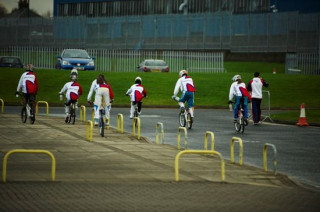
"The message I am trying to get out there is a hard one to put across - I think that the current crop of young riders are too influenced by the fashionable BMX training methods; the sprint drills and gym work, the training that makes you big and strong at 18. Unfortunately that isn't enough to win big races."
Instead, Hayes insists that the establishment of good technique both on the bike and in the gym are the biggest barriers to success and speaking candidly, reveals there is one piece of kit which is stunting the development of more top British BMX riders; SPD pedals.
Placing his coffee aside, a fuller explanation follows.
"The biggest thing that has hindered skill development are clips - so much so that I'd like to see the French system adopted where until you are over 16 you can't go onto clips. We don't think of them as being essential things; more the cherry on the cake. What's important is that riders learn technique through playing on the bike and that's something which clips discourage. You can see that legacy is now creeping into racing; I can name riders who have raced internationally who would benefit from taking the clips off their bikes and going back to basics. That's because they are missing the fundamentals learned on flat pedals and that's the focus of the Talent Team; developing rider skills.
"Our talent team have to go out practising manuals, wheelies, slalom; I'm going to start running backhop comps and 360 comps - the things we would do as kids on our bikes but that seem to be forgotten with the advent of race bikes with carbon forks, clips and parents being protective over expensive kit. Our development is totally converse to that - it can be done on any BMX, in any weather and without access to a specialist facility."
As the cones are measured into place it becomes alarming at how basic the facilities can be. For the manual assessment riders use their bottles to mark progress on a fifty-metre strip which is usually home to lorry drivers on overnight breaks. The same setup is used for wheelies and timed sprints, before a small re-design creates a slalom far tougher than any desolate, boulevard-wide BMX track.
Perhaps most disappointingly however, was the way these sessions were devised; Hayes finding that even before riding the track, applicants for last years Talent Team didn't posses skills which in the past have been seen as the most basic.
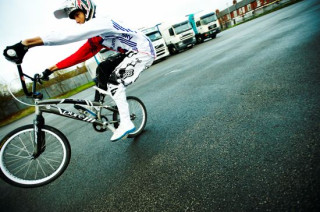
"This year to get onto the Team the bar is higher and our development of basic skills is the reason for that. This year we've had underage riders challenging in the Junior category - it has been the most measurable result of success and something down to our mantra: repeatable performance of predetermined skills. And not only on the track. They might be able to manual between a set of doubles, but can they do it every time and is it repeatable?"
With times and distances recorded from today's session, the next gathering of the Talent Team and a comparison of results six weeks on will answer that question. But as the sun sets there's still time for three more hours of training - albeit from relative discord of competition in the carpark to the discipline and quiet of the gym.
That's because once again the basics reserve absolute focus; today's session being the typical observation of technique over style - something Hayes is keen to drum into the students.
"I would rather you work with just the bar for a year and develop the best technique, rather than lift personal best weights and get injured. Because with the wrong technique, injury is the only outcome."
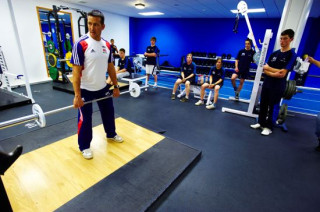
Want to be a part of the Talent Team but don't know where to start? Here's our basic guide and a couple more insights when it comes to what the selectors are looking for.
Talent Team selection runs in October, with application forms appearing on the British Cycling website around September. To qualify for a place on the Talent Team you don't have to be the complete rider - the programme is all about development. What is expected is the right attitude and the basic skills of BMX racing.
If you've not got those skills then go away and practice until you are confident. That practice can be alone or with the support of a British Cycling BMX club - the structure of which is currently undergoing changes to help deliver riders onto the Talent Team.
There is no rider quota for the Team - however many riders make the grade will qualify.
Jeremy's Top Five Tips:
1. Watch the best BMX riders and compare them against video of yourself. If you were a young footballer you'd be studying the Premiership - BMX is no different and video is one of our biggest tools of review.
2. Use flat pedals. Making the core skills look easy is a way to impress on selection camps.
3. Know what you want to achieve - we look for those who have ambitions in line with our own.
4. Use the gym as a tool for your success, but never forget you're a bike rider first.
5. Remember that you don't always need a BMX track to become a better BMX rider.
